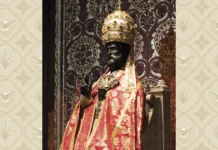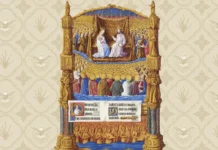It is not difficult to see how the new moral system is derived from existentialism, which abstracts from God or simply denies Him, and in either case, abandons man to himself.
T oday we would like to take the opportunity of this meeting with you to present our thoughts on a certain phenomenon that is occurring more or less everywhere in the Catholic life of faith, and which in some way affects everyone, but particularly young people and their educators. […] We could call it a new conception of the moral life, since it is a tendency that manifests itself in the area of morality. […]
It could be called “ethical existentialism”, “ethical actualism”, “ethical individualism”, these expressions understood in the restrictive sense that we will later explain, and such as are found in what has been called elsewhere Situationsethik – situational ethics.
The negation of an objective moral law
The characteristic sign of this morality is that it is not based in fact on universal moral laws, such as, for example, the Ten Commandments, but rather on the real and concrete conditions or circumstances in which one must act, and according to which the individual conscience must judge and choose.
This state of things is unique and is only valid once for each human action. For this reason – the advocates of such ethics assert – the decision of conscience cannot be commanded by universal ideas, principles and laws. […]
[Situational ethics] does not plainly deny general moral concepts and principles – although it sometimes comes very close to making such a denial – but displaces them from the centre to the extreme periphery. […]
Implications of this fatal error
For example, in the field of faith – the personal relationship that links us to God: If a seriously formed conscience were to decide that abandoning the Catholic Faith and adhering to another religion brings us closer to God, this decision would be “justified”, although it is generally qualified as “abandonment of the Faith.” Or again, in the field of morality, another example is the gift of self, corporal and spiritual, among young people. Here a seriously formed conscience could decide that, by reason of a sincere mutual inclination, physical and sensual intimacies are admissible, and these, although only allowable between spouses, would become permissible expressions. […]
Judgments of conscience of this nature, even if at first sight they appear contrary to divine precepts, would hold good before God, because – as it is said – before God, a seriously formed and sincere conscience prevails over “precept” and “law”. Such a decision would therefore be “active” and “productive”, not “passive” and “receptive” of the decision of the law inscribed by God in the heart of each one, still less of the Decalogue engraved by the finger of God on tablets of stone, leaving to human authority the task of promulgating and maintaining it.
The new ethics – adapted to circumstances –, say its authors, is eminently “individual”. In the determination of conscience, each individual meets directly with God and decides before Him, without the intervention of any law, any authority, any community, any cult or confession, on anything and in whatever way. […]
These two points, the right intention and the response, are what God takes into consideration; the action does not matter to Him. Thus, the response can be to exchange the Catholic Faith for other principles; to divorce, to terminate a pregnancy, to refuse obedience to the competent authority in the family, in the Church, in the State, and so on. […]
The true Catholic position
Explained in this way, the new ethics are so far removed from Catholic law and principles that even a child who knows his catechism will be well aware of this. It is not difficult to see that the new moral system is derived from existentialism, which abstracts from God or simply denies Him, and in either case abandons man to himself.
It may be that current conditions have led to an attempt to transplant this “new morality” into the Catholic domain in order to make the difficulties of Christian life more bearable for the faithful. […] But such an attempt can never succeed. […]
Moreover, We counter “situational ethics” with three considerations or maxims. First: We agree that God always and primarily desires an upright intention, but this is not enough. Second: it is not licit to do evil in order that good may result from it (cf. Rom 3:8); and – perhaps without realizing it – this ethics acts on the principle that the end sanctifies the means. Third: situations may arise in which a person, especially a Christian, cannot ignore the fact that he must sacrifice everything, including his life, to save his soul.
All the martyrs remind us of this. And there are many, even in our own time. The mother of the Maccabees and her sons, Sts. Perpetua and Felicity – notwithstanding their newborn children –, Maria Goretti and thousands of others, men and women, whom the Church venerates; did they all, in confrontation with the “situation”, suffer a bloody death futilely or even by mistake? Certainly not; and they are, with their blood, the most eloquent witnesses of the truth against the “new morality”.
The timelessness and absolute value of Catholic morality
Where there are no absolutely binding norms, independent of any circumstance or eventuality, the situation that “happens only once” in its uniqueness requires, it is true, careful examination to decide which norms to apply and how to apply them.
Catholic morality has always dealt in detail with this problem of the formation of the personal conscience through prior examination of the circumstances of the case to be resolved. Everything it teaches offers a precious aid to the determinations of conscience, both theoretical and practical.
It suffices here to cite the unsurpassed teachings of St. Thomas on the cardinal virtue of prudence and those derived from it.1 His treatise shows a sense of personal activity and of actuality which contains all that is just and positive in “ethics in accordance with the situation,” while avoiding its deviations and misconceptions.
For the modern moralist it will suffice, therefore, to continue in the same vein if he wishes to study new problems more deeply. ◊
Excerpts from: PIUS XII. Address to
the Congress for the World Federation
of Catholic Young Women,
18/4/1952: AAS 44 (1952), 413-418
Notes
1 ST. THOMAS AQUINAS. Summa Theologiæ. II-II, q.47-57.







